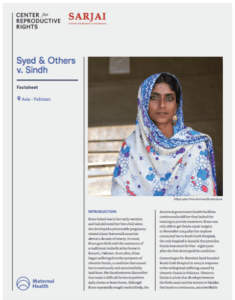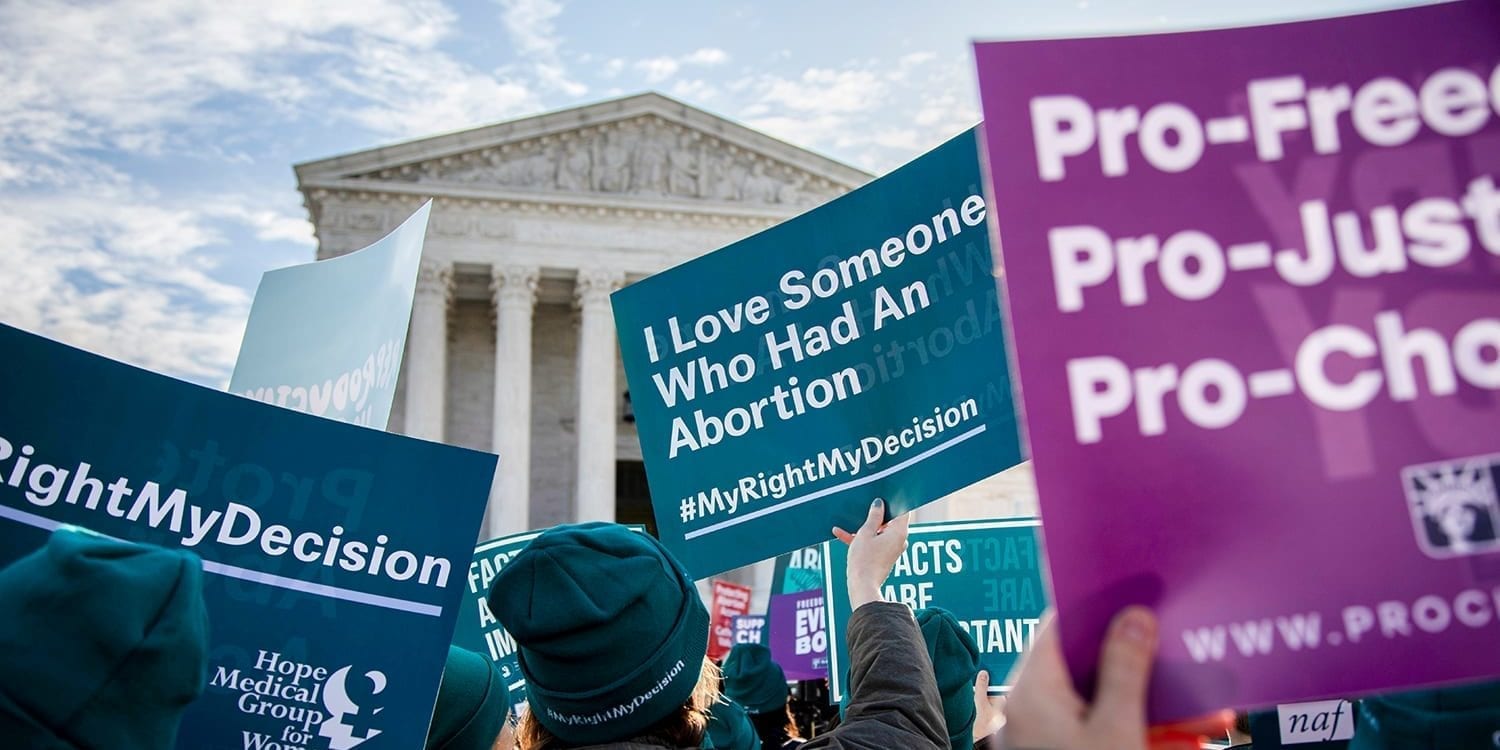Syed & Others v. Province of Sindh & Another (Sindh High Court of Pakistan)
Pakistan’s Sindh Government Increases Access to Obstetric Fistula Repair Services to Comply with Orders by the High Court
(Updated 02.02.22) As a result of this case – the first filed in Pakistan that sought recognition that the widespread incidence of obstetric fistula was a violation of women’s fundamental rights under the Pakistan Constitution – women in the Sindh Province of Pakistan now have access to obstetric fistula repair services in government hospitals. On December 15, 2021, the Sindh High Court issued its final court order in the petition on obstetric fistula after the government of Sindh reported that it had made significant progress staffing government hospitals with gynecologists and establishing fistula repair centers that provide fistula repair surgeries free of cost.
Case Background
A public interest petition was filed in 2015 demanding that the government take measures to prevent and treat obstetric fistula, a devastating pregnancy-related injury that affects thousands of women in Pakistan every year.
Obstetric fistula is a hole that develops between the birth canal and the rectum or bladder that leads to continuous, uncontrollable flow of urine, feces or both. The primary cause is obstructed labor that is not properly addressed through timely emergency obstetric care. Women from low-income backgrounds in Pakistan face barriers to accessing quality obstetric care services and often give birth without trained birth attendants and without access to medical facilities—increasing their chances of developing obstetric fistula. Although it is a preventable condition, it is estimated that 5,000 new cases of fistula emerge in the country every year.
The case, Syed & Others v. Province of Sindh & Another, was filed at the High Court of Sindh by the Center’s Legal Advisor, Sara Malkani, on behalf of the petitioners: Kiran Sohail, a survivor of obstetric fistula; Dr. Shershah Syed, a gynecologist providing fistula repair services; and Tehrik-e-Niswan, a Pakistani women’s rights organization. Sohail, a mother of six, developed obstetric fistula after having her first child. Although she repeatedly sought medical help, the doctors at government health facilities she approached lacked the training to provide treatment. She suffered with the condition for eight years, until she obtained repair surgery in 2014 at Koohi Goth Hospital—the only hospital in Karachi that provides fistula treatment free of charge.
Developed through the Center’s South Asia Reproductive Justice and Accountability Initiative (SARJAI), the petition demanded that the government ensure affordable access to, and information about, treatment for obstetric fistula in every district in the Province of Sindh. The petition also requested that the High Court order the Sindh Maternal, Neonatal and Child Health Programme and the Sindh Department of Health to:
- Train and equip one gynecologist in every District hospital in Sindh to provide fistula repair surgery.
- Provide basic and comprehensive emergency obstetric (maternal) care in accordance with the NMNCH Framework.
- Ensure that community midwives are trained and deployed across Sindh in accordance with the NMNCH Framework.
The public interest petition sought to hold the government accountable for denial of timely and adequate treatment of obstetric fistula, and was the first case filed in Pakistan that sought recognition that the widespread incidence of obstetric fistula was a violation of women’s fundamental rights under the Pakistan Constitution, including their rights to life and dignity. The petition also demanded that the government comply with its international treaty obligations under the Convention on Elimination of All Forms of Discrimination Against Women and the International Covenant on Economic Social and Cultural Rights.
In February 2019, the High Court ordered the government to implement measures to provide access to obstetric fistula care in the province of Sindh, including creation of fistula repair centers and the recruitment of qualified gynecologists in government hospitals.
After the ruling, the Center monitored the implementation of the court order and found that there were gaps in the enforcement. Due to the failure of the government to act expeditiously, an application was filed in August 2019 seeking further directions to the government to ensure full implementation of the Court’s order.
On December 15, 2021, at the final hearing, the High Court disposed of the petition after it acknowledged that the government had taken significant steps towards the implementation of the Court’s decision, including:
- Training gynecologists in four fistula repair centers across the province to conduct fistula repair surgeries, free of cost. Their data showed that 34 surgeries have been conducted in these centers in 2020 and 2021.
- Equipping two hospitals in the city of Karachi to provide fistula repair surgery, where 33 surgeries have been provided since 2020.
- Scheduling interviews for early 2022 to fill the remaining vacancies for gynecologist posts in government hospitals in Sindh.
Plaintiff(s): Kiran Sohail, Dr. Shershah Syed, Tehrik-e-Niswan
Respondents: Sindh Maternal, Neonatal and Child Health Programme, Sindh Department of Health
Center Attorney(s): Sara Malkani
Case Timeline:
- July 2015: The Center and petitioners file petition with the Sindh High Court alleging that the government failed to prevent high incidence of obstetric fistula, violating women’s fundamental rights under the Pakistan Constitution.
- February 2019: Sindh High Court directs Sindh government to recruit gynecologists in government hospitals and establish four fistula repair centers.
- August 2019: Petitioners file an application seeking directions to the government to implement the High Court’s orders.
- December 2021: Sindh High Court disposes of the petition after the Sindh government reports significant progress in establishing fistula repair centers and services.
Read more about Syed & Others v. Sindh

News on the case:
- Pakistan’s Sindh Government Increases Access to Obstetric Fistula Repair Services to Comply with Orders by the High Court, 01.20.22
- Pakistan Court Orders Implementation of Measures to Address Obstetric Fistula, 02.27.2019
- Pakistani High Court Calls for Response to Allegations Women Are Denied Maternal Health Services, 09.01.2015
- South Asia Reproductive Justice and Accountability Initiative (SARJAI), 03.19.2021
- Pakistan Court Orders Implementation of Measures to Address Obstetric Fistula, 02.27.2019
- The forgotten, rejected and neglected women of Pakistan: Kiran’s story, 01.30.2019
- Pakistan Addresses High Rate of Fistula, 05.23.2016
- Unnecessary Suffering, 11.10.2015

